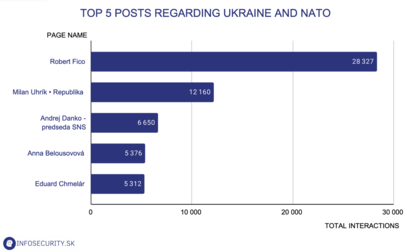DISINFORMATION
Pro-Russian actors talk about peace, oblivious to Russian aggression

Infosecurity.sk presents an overview of disinformation trends that have been on the rise in information space in the past two weeks:
- Ukraine is still a dominant topic in disinformation trends in Slovakia. Pro-Russian actors spread several false narratives.
- According to some, the US is prolonging the war for their own interests. Disinformers are trying to create the impression that the White House dictates the policy of the European Union and Ukraine.
- The explosions on the Nord Stream pipelines and the Kerch bridge are allegedly terrorism staged by the Ukrainians and the US. The aim of the attacks, according to disinformers, was to provoke Russia further.
- Another false narrative is that peace in Ukraine lies solely in the hands of the West, and if the Western leaders were willing to negotiate, the war would have ended long ago.
- In addition, Ukraine has applied for fast-track NATO membership. Various actors have exploited the issue to promote pro-Russian standpoints.
The US is allegedly prolonging the war in Ukraine to further its agenda
False narratives about the US are constantly present among pro-Russian actors. According to some, Washington is using the war in Ukraine to further its own interests, deliberately prolonging it and dictating policy to the European Union or the Ukrainian government.
The most common disinformation narrative is that the European Union only acts on Washington's instructions. According to Erik Kaliňák, the young face and vice-chair of the Smer-SD party, the European Union depends on the decisions of the US, which allegedly prevent peace and deliberately prolong the war. Narratives of President Biden supposedly not caring at all about what Ukraine will look like after the conflict also emerge. The same narrative has long been promoted by Ľuboš Blaha, deputy chairman of the Smer-SD party. Blaha claims that, because of the policies of the European Union, which are supposedly being dictated by the Americans, we are now in danger of a nuclear conflict with the Russian Federation.
Another popular narrative is that Ukraine or Ukrainian President Zelensky is controlled by the US. Ľuboš Blaha calls Zelensky a clown, Ukraine's greatest tragedy, and claims he is just a puppet of the US. In another post, Blaha argues that Zelensky's government is just a “client regime” of the US. Anna Belousovová, a former member of the Slovak parliament, spreads similar narratives while claiming that Zelensky is being controlled directly from the US.
Ľuboš Blaha, who has long been promoting pro-Russian views, also suggests that the US is behind European sanctions against Russia, which, however, do not affect Russia in any way. According to him, they are not even sanctions against Russia, but against us - against Europeans, against Slovaks. With this, Blaha appeals to the needs of citizens while spreading fear with false claims. This way, he aims to excuse the true aggressor responsible for the crisis.
Nord Stream pipelines and Kerch bridge
Pro-Russian actors have also tried to link the explosions on the Nord Stream 1 and Nord Stream 2 pipelines and the explosion on the Kerch Bridge, which connects Crimea to Russia. They often suggest that the US is behind both events in order to provoke Russia and escalate the conflict.
The aforementioned Anna Belousovová, who does not hide her nationalist sentiments, sees a clear agenda behind both events. She says they are targeted provocations of Russia, with the West testing how far it can go to pressure Russia. Belousovová claims the US and Zelensky have spread media lies about Putin wanting to use nuclear weapons so that they can justify a pre-emptive attack on Russia. She ends her Facebook post by stating: "So far, only thanks to Putin, there is no World War III. For now..."
Eduard Chmelár, a politician, former journalist and long-term pro-Kremlin actor, is convinced that the US is behind the Nord Stream pipelines explosions. He is also simplifying the issue when arguing that accusing Russia of explosions is the same as when the US accused Iraq of having weapons of mass destruction. Chmelár asks why we need the European Union, if it is unable to define the boundaries beyond which it is no longer willing to tolerate hostile action by the US. This is yet another example of the US and the EU forming a joint vessel, which is not only being attacked by disinformation but is also being targeted with attempts to destabilise their mutual relations.
According to pro-Russian actors, peace in Ukraine is in the hands of the West
In recent weeks, the disinformation narrative that Western actors - whether the European Union, the US, NATO, or the Slovak government itself - are not interested in peace in Ukraine have intensified.
It is a fairly frequent talking point of ex-PM Robert Fico. In a viral Facebook video, he talks about how the European Union prefers to escalate international tensions by considering Ukraine in NATO instead of preparing and enforcing a peace deal to end the war in Ukraine. "Everything seems to be agreed," Fico says. The former prime minister also blames Ursula von der Leyen, the European Commission president, for not using the word peace in her recent speech.
Similarly, Erik Kaliňák, about whom we have written before, argues that instead of sending weapons, imposing sanctions and giving hundreds of millions to prolong the war, the European Union should rather make efforts to negotiate the terms of peace.
Milan Uhrík, a far-right MEP who recently voted against further military aid to Ukraine in the European Parliament, also speaks about peace. Uhrík talks about "war hawks in the EU" and argues: "Whether one likes it or not, this conflict can only be ended at the negotiating table."
By talking about peace, the various actors are only covering up their pro-Russian views, trying to give the impression that the question of ending the war is a decision of the West alone, and justifying Russia in continuing its aggression in Ukraine.
Fear-mongering as a tool to spread pro-Russian stances
As soon as Ukraine formally applied for fast-track NATO membership, pro-Russian actors began to spread a shared narrative. They operate on fear-mongering, claiming that Ukraine's admission to NATO would automatically mean a full-scale nuclear war. Nuclear threats have been one of the most common tools of Kremlin propaganda since the beginning of the war in Ukraine.
Although Ukraine has applied to join NATO and some Alliance members have supported this step, this does not automatically mean that Ukraine will become a NATO member in the immediate future. Nevertheless, various actors exploit the issue to spread fear, false narratives and pro-Russian positions.
For example, Eduard Chmelár talks about the nuclear apocalypse or nuclear holocaust in connection with Ukraine in NATO. At the same time, he argues that war in Ukraine might not even have happened if the West had been willing to negotiate. He takes the opportunity to mention the bombing of Yugoslavia by NATO aircraft. He defends himself in advance: "This is not 'whataboutism' - we should not use this stupid propaganda word, which has no basis in the literature [...]."
Former MP Anna Belousovová, who has recently become popular on social media, misleads and claims: "Ukraine has applied for membership, so there will definitely be a vote in the Slovak parliament." Even though Ukraine has applied for membership, the Slovak Parliament will not be voting on it anytime soon. Belousovová also calls on all MPs and voters to realize that a vote on Ukraine in NATO will also be a vote on World War III. Behind all this, she sees that NATO is ready to go into a direct conflict with Russia.
Marián Kotleba, the chairman of the extremist party Kotlebovci-ĽSNS, also criticized NATO while reacting to the ratification of the membership of Finland and Sweden in NATO in the Slovak Parliament. He refers to NATO as a criminal organization and condemns 126 (of the 150) MPs who voted in favor of membership as traitors. He sees NATO enlargement as a step towards dragging Slovakia into a war with Russia. The situation development is supposed to be following a plan of the globalists who want to unleash a war with the Russian Federation according to Kotleba.
Since Ukraine’s NATO membership was a heavily discussed topic among several actors, we decided to look at it through the CrowdTangle analytical tool. The graph below shows the most popular posts on Slovak Facebook that contain a combination of the keywords NATO and Ukrajina (Ukraine in English). Analysis was conducted among actors who often promote disinformation narratives. Posts were evaluated by total interactions (all reactions, comments and shares).

As we can see from the results, former Prime Minister Robert Fico dominates the debate. In the video post devoted to Ukraine's membership in NATO, he talks about World War III and criticizes the European Union for not making efforts toward peace instead. He also talks about the domination of US foreign policy and claims that President Zuzana Čaputová is controlled by the West.
The second place belongs to MEP Milan Uhrík, chairman of the Republika party. He calls Ukraine in NATO a crazy idea, and those countries that support it want to join the war. He is also critical of the enlargement of NATO by Sweden and Finland.
Andrej Danko, the Slovak National Party chairman, criticizes Zelensky for saying that Slovakia also supports Ukraine's accession to NATO. According to Danko, this is dragging Slovakia into a war, and only an irresponsible fool could express such support for Ukraine.
Anna Belousova, who was discussed above, does not address Ukraine's NATO membership. However, in her post, she refers to the Kerch bridge explosion as an act of terrorism carried out by the Ukrainians along with NATO and the US.
The chart is closed by Eduard Chmelár, who talks about a nuclear holocaust in the context of Ukraine in NATO. He calls on states to stop flexing their muscles and instead seek a diplomatic solution to the war. He also argues that an inspiration and a precedent for Putinhas its origins in the NATO bombing of Yugoslavia and the declaration of independence by Kosovo.
Project Infosecurity.sk organized by Adapt Institute, which is supported by the Prague office of the Friedrich Naumann Foundation for Freedom, continuously monitors the activities of both Slovak and foreign disinformation actors, but focuses mainly on the former. The project activities are built upon daily monitoring of emerging disinformation, hoaxes, and conspiracy theories in the online information space. This approach allows the analysts to identify disinformation posts and narratives that resonated with the public the most, as well as to find out where they originated, and how they spread and evolved on social media. The report takes the form of a bi-weekly summary of arising trends in the spread of malicious information content online. Based on that, Infosecurity.sk can warn the public about emerging and current trends in the field of disinformation, manipulation, and propaganda.

